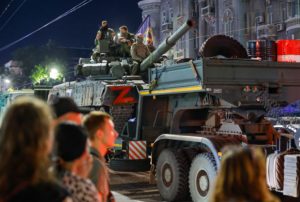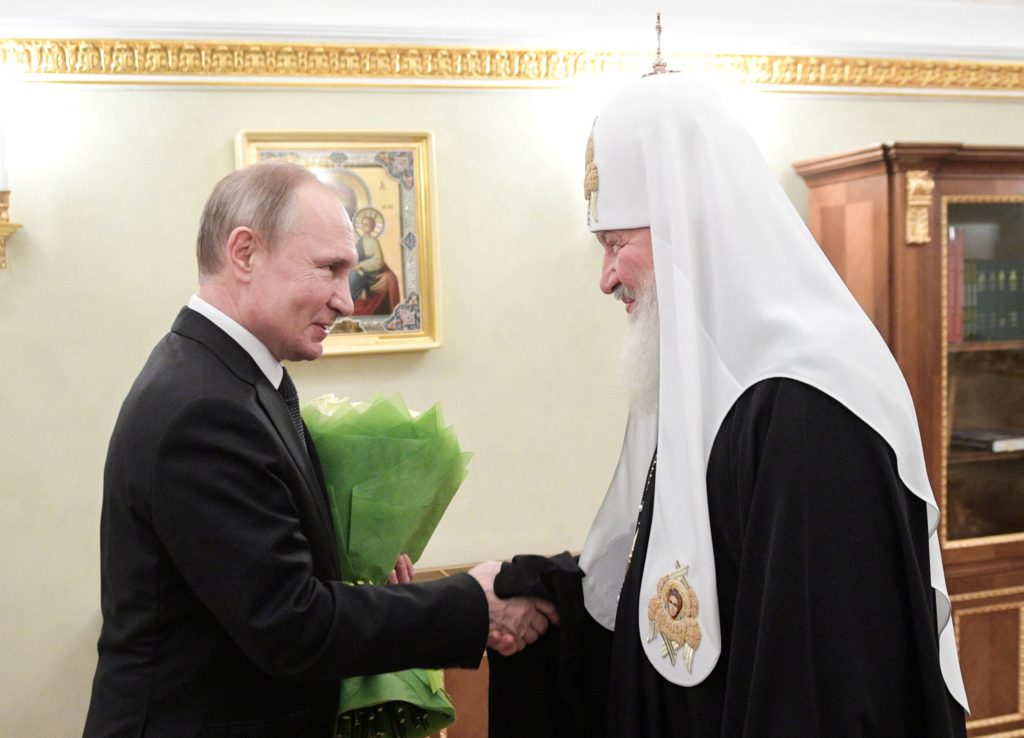ROME — When Vladimir Putin’s grip on power in Russia seemed momentarily imperiled last month, one institution above all proved to be his last line of defense.
It wasn’t the military, which failed to react to an abortive march on Moscow by the Wagner Group, nor was it the country’s class of oligarchs, some of whom reportedly made preparations to flee depending on how things developed.
It was instead the Russian Orthodox Church, which, at least at the leadership level, stood compactly behind Putin as the short-lived insurrection played out.
Patriarch Kirill of Moscow, head of the Russian Orthodox Church, issued a statement Saturday, June 23, just moments after the insurrection began to unfold, calling on believers to defend national unity.
“Today, when our brothers fight and die on the fronts, selflessly fulfilling their duty, when the enemies are making every effort to destroy Russia, any attempt to sow discord within the country is the greatest crime that has no justification,” Kirill told the Russian people.
“As the primate of the Russian Orthodox Church, I urge those who, having taken up arms in their hands, are ready to direct them against their brethren, to think again,” Kirill said.
“I support the efforts of the head of the Russian State aimed at preventing unrest in our country,” he said — and, just in case it wasn’t clear, by “head of the Russian state,” he meant Putin.
Meanwhile, Metropolitan Mercury of Rostov and Novocherkassk, the area where mercenaries of the Wagner Group temporarily occupied Russian military headquarters, led a prayer service to invoke the quick departure of what he called our “uninvited guests.”
Metropolitan Tikhon of Pskov and Porkhov issued a statement saying that Russians must rally around Putin to prevent a division that would be fatal for the country.
“Keeping faith and convictions, put aside strife and discord, no matter how important they may seem to the parties to the conflict, and be in unity with those whom God’s Providence has put to rule Russia, no matter how this person is called in history: Grand Duke, Tsar, Emperor or Chairman of the State Defense Committee and Supreme Commander of the Armed Forces of the USSR. ... Today President Vladimir Putin bears this burden, cross and responsibility,” he wrote.

Fighters of the Wagner private mercenary group pull out of the headquarters of the Southern Military District to return to base, in the city of Rostov-on-Don, Russia, June 24. (OSV News/Alexander Ermochenko, Reuters)
Archpriest Alexander Dobrodeev, effectively the Russian Orthodox Church’s chaplain to the military and law-enforcement agencies, said loyalty to legitimate authority is necessary so “the devil does not win.”
“Legitimate authority is strength, loyalty to legitimate authority is strength,” Dobrodeev said.
“Our task is to keep peace, order, [to protect] our traditional values from attack,” he said. “If discord starts, strife, it will not end just like that, it will be complete annihilation. This is the new weapon of Satan, which he uses, since neither the atomic bomb, nor any super-modern weapons help. Confrontation: This is our weakness and the strength of Satan, we need to resist this.”
Bottom line: The message from the Russian Orthodox leadership was firmly in favor of loyalty to Putin and the Kremlin.
In all honesty, that shouldn’t be surprising to anyone. A tight connection between throne and altar, as the statement from Metropolitan Tikhon suggested, has been a defining feature of the Russian Orthodox faith since the beginning. The church sees itself as the soul of the Russian nation, and defending Russia’s stability is in the church’s DNA.
Nonetheless, the clearly pro-Putin stance of the Russian Orthodox leadership could have implications for ecumenical relations with the Vatican, and Catholicism more broadly, going forward.
To begin with, the compact support for Putin demonstrated by Russian Orthodox leaders may deepen skepticism among Catholics involved in ecumenical dialogues as to whether they’re truly talking to religious and spiritual counterparts, or to figures who sometimes come off as Kremlin agents.
This is not, of course, a new phenomenon. During the Cold War, Russian Orthodox clergy who participated in ecumenical platforms such as the World Council of Church were often accused of being effectively Soviet plants, and, given what we now know about efforts by Soviet-era intelligence services to control and infiltrate the clergy in their territories, it wasn’t an unreasonable concern.
What the past weekend confirmed is that in a different guise, the same hermeneutic of suspicion about the Russian Orthodox in ecumenical circles may well circulate today.
When it comes to the Vatican and Pope Francis, from the beginning of the conflict in Ukraine they’ve tried to maintain a nonaligned, “super partes” (“impartial”) stance, striving to position themselves as potential mediators. The pope’s special envoy on the conflict, Italian Cardinal Matteo Zuppi, was recently in Moscow to again offer the Vatican’s services.
The difficulty now for Francis and his team is that any exchange they have with the Russian Orthodox will, de facto, be seen by the Ukrainians and their allies as contact with the enemy … a little like meeting Yevgeny Prigozhin, perhaps, before his brief mutiny.
In other words, by aligning themselves so closely with Putin, the Russian Orthodox leadership may have made itself a less effective interlocutor with outsiders, even with parties such as the Vatican inclined to meet Russia halfway.
Of course, it’s hard to fault Kirill and other Russian prelates for simply doing what their predecessors have done since time immemorial. Every choice, however, including those which are entirely predictable, comes at a cost, and the Russian Orthodox Church may find its tab coming due in ecumenical contexts going forward.

